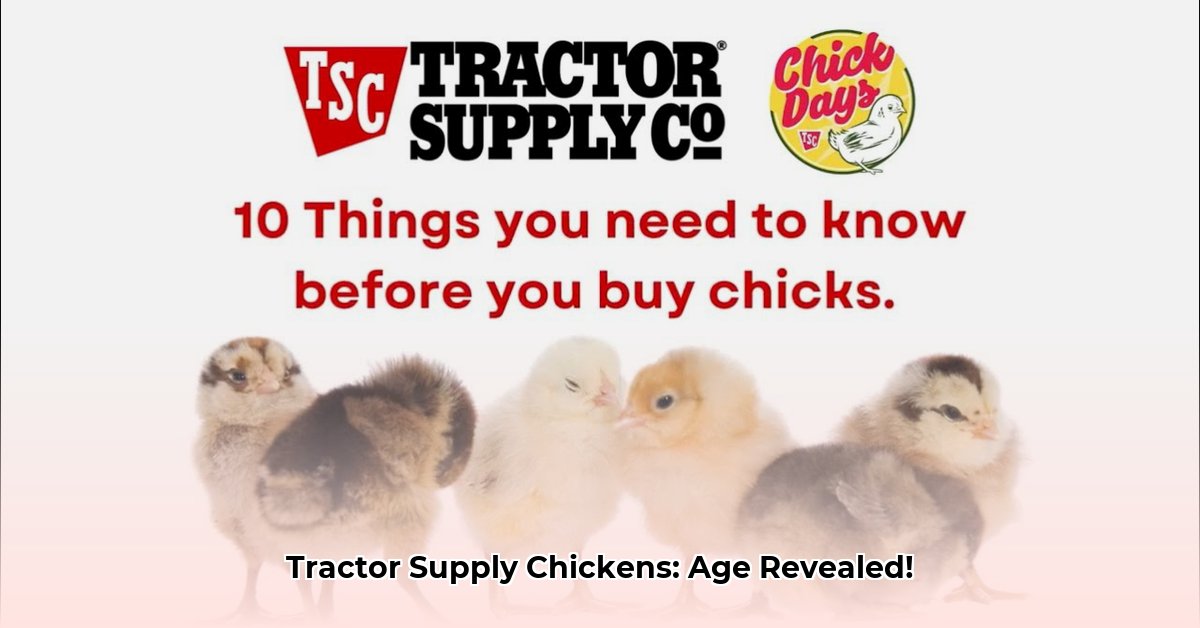
So you're ready to welcome some fluffy chicks into your life! Getting chicks from Tractor Supply is a popular choice, but knowing their age is key to their successful upbringing. This guide will walk you through everything you need to know, from choosing the right age chicks to keeping them healthy and happy. For more tips on raising chicks, check out this helpful resource: Easy Chicken Tractor Guide.
How Old Are the Chicks at Tractor Supply?
Tractor Supply typically sells chicks that are one to four days old. Think of them as newborns, just starting their journey to becoming laying hens or proud roosters. This young age means they need extra care and attention during their initial weeks. Their age might vary slightly depending on whether you purchase them in-store (usually youngest) or order online (allowing for travel time).
Understanding Your New Chicks' Age: In-Store vs. Online
Acquiring chicks in-store generally means they're the youngest – typically just a few days old. Ordering them online adds a day or two to their age due to shipping. While this difference might seem minor, it's crucial to remember when planning their care.
Setting Up Your Chick's Nursery: A Step-by-Step Guide
Before your chicks arrive, create a safe and warm environment – their brooder. It's like their nursery!
The Perfect Home: Choose a sturdy box or tub, large enough for movement but small enough to retain warmth. Ensure good ventilation. Line the bottom with absorbent, easily cleaned material like paper towels.
Warmth is Vital: Chicks are very sensitive to cold. Use a heat lamp or brooding plate to maintain 90-95°F (32-35°C) the first week, gradually lowering as they grow. Think of it as gently decreasing the temperature in their nursery as they mature.
Food and Water: The Essentials: Provide chick starter feed (specially formulated for their nutritional needs) and fresh, clean water in a shallow dish or chick waterer to prevent drowning. Cleanliness is paramount!
Become a Chick Detective: Regularly check your chicks for signs of illness or stress. Are they eating and drinking normally? Early detection is crucial for their health. Are they active and alert, or lethargic?
Caring for Your Chicks: The First Eight Weeks
The first eight weeks are crucial for your chicks’ development.
Weeks 1-4: Continue providing warmth, gradually reducing the temperature. They need plenty of chick starter feed during this rapid growth phase.
Weeks 4-8: Switch to "grower" feed (formulated for older chicks). Begin short supervised outdoor time on warm, sunny days, ensuring protection from predators and harsh weather.
Moving to the Big Coop: Transitioning Outdoors
Around eight weeks, your chicks can transition gradually to their outdoor coop. This isn't a sudden change—start with short outdoor sessions, gradually increasing the time. Remember, they still need protection from predators and the elements.
Choosing Your Feathered Friends: Breed Selection
Tractor Supply usually offers a variety of common chicken breeds, but availability varies by location and supplier. To ensure you get your preferred breed, call your local store before visiting.
Addressing Potential Challenges: What to Expect
Raising chickens presents some challenges:
Disease Prevention: A clean coop, reputable chick sources (like Tractor Supply), and proper nutrition are vital for disease prevention.
Predator Protection: Secure housing is essential to protect your flock from predators like foxes, raccoons, or birds of prey.
Budgeting: Remember to budget for feed, bedding, and potential veterinary care.
How to Reduce Chick Mortality Rate from Tractor Supply Chicks
While some chick loss is expected, a high mortality rate indicates a problem. Let's explore strategies for a successful start:
Key Takeaways:
- Source healthy chicks: Carefully inspect chicks before purchase, rejecting any weak or unhealthy ones.
- Optimal brooding: Maintain consistent warmth and humidity; monitor temperature closely.
- Cleanliness is paramount: Clean feeders and waterers daily; disinfect regularly.
- Proper nutrition: Utilize high-quality chick starter feed and ensure access to clean water.
- Biosecurity: Practice good biosecurity to prevent disease.
Step-by-Step Guide to Reducing Mortality
Pre-Arrival Preparation: Clean and disinfect the brooder, set up your heat lamp and thermometer, and prepare feeders and waterers.
Arrival and Initial Care: Examine chicks for illness, provide immediate access to feed and water, and maintain the ideal brooding temperature.
Ongoing Care and Monitoring: Monitor feed and water; clean and disinfect frequently; check chicks daily for illness and isolate sick birds immediately.
Addressing Potential Problems: Address temperature fluctuations, disease outbreaks, and nutritional deficiencies promptly.
Actionable Steps if Mortality Occurs: Contact Tractor Supply immediately; consult a veterinarian or agricultural extension office.
Beyond the Basics: Long-Term Strategies
For long-term chick health, consider genetic selection (if possible) and investment in a well-ventilated, predator-proof coop.